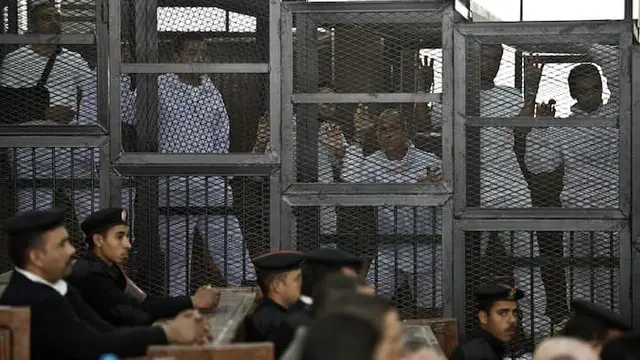"16 years ago, insolvency led me to prison, but this did not break my will and I successfully started a new business inside the prison with the help of the penitentiary authority," Fatma Ahmed, an Egyptian lady in her 50s, said as she welcomed visitors at an exhibition displaying her handmade craft items in prison.
In 2000, the businesswoman received a 20-year imprisonment term for being unable to pay her debts after her business collapsed. But this was not the end for the dreaming lady.
"I did not give up and I thought about launching my own business from inside the prison," the lady said as visitors showed admiration of her handmade works. "It was not easy in the beginning, but I insisted to go on to reach my goals."
Her goals were not only making a good business, but also teaching female inmates some crafts to help them earn money and start a new life when they are out of the prison walls.
Under job projects organized by the Egyptian interior ministry, Ahmed, a mother of three, has so far taught hundreds of female inmates several handicrafts such as weaving, knitting, embroidery and making handmade craft items and accessories.
"We have even renovated the normal trends. We design our own styles with stunning finishes and supreme attention to quality standards," she said, flashing a proud smile.
Right now, there are 480 women working inside the al-Qanater al-Khayriya prison under the supervision of Ahmed, who is called "Mama Fatma" by most of the prisoners.
"She is a great talented and loving person," Abeer, an inmate in her late 30s said.
"Mama Fatma taught me lots of skills, she turned the normal work of weaving and knitting into an art form," Abeer told Xinhua as she observed visitors' encouraging reactions and appreciation of their temporary exhibition at al-Marg prison in Qalyubia governorate, 45 km north of Cairo.
Wearing white gown and hair scarf, Ahmed said her achievements have seen the light thanks to the efforts and the facilities provided by the prison authorities.
"The prison authorities help us in many ways. They provide us with the workshops, the materials and the equipment, and even hold exhibitions for our products at hotels, social clubs and big malls," she said.
The lady said she and the girls working with her only pay for the raw materials, "but anything else is given by prison administration for free."
"What people see in movies and dramas, and listen from human rights groups about the miserable conditions of Egyptian prisons is totally false," Ahmed revealed as she looked at a group of male prisoners playing football in green playground just near her exhibition.
For decades, local and international human rights organizations as well as opposition parties accused the Egyptian government of ill-treatment, poor medical care and even torture of prisoners.
In an attempt to refute these allegations, the interior ministry now organizes frequent prison visits to local and foreign journalists, parliamentarians and human rights activists to have a closer look at the real conditions inside the country's prisons.
"Our policy mainly focuses on two factors, keeping inmates connected with the society and rehabilitating prisoners vocationally and psychologically to integrate them into the society when their terms are over," assistant interior minister Major General Hassan al-Sohagy told a cultural forum held at the Marg prison that was largely attended by journalists and human rights activists.
He further said that the Egyptian prisons give great attention to the engagement of their prisoners in crafts, industries and activities which in addition to respective financial return, yield moral gains are rehabilitative returns as well.
Prisoners are categorized by age, physical ability and previous experiences and then distributed among various productive fields such as agriculture, carpentry, wooden and metal furniture production, craft industries, poultry farming and livestock production, al-Sohagy said.
Regarding education, al-Sohagy said, the Egyptian penitentiary authorities care about educating the prisoners who were deprived of education through a comprehensive illiteracy program so they catch up again with pre university or the university levels and even to achieve the highest scientific degrees such as masters or doctorate degrees.
According to official statistics of the interior ministry, 7,552 prisoners have passed the illiteracy program, 1,965 have passed different pre-university educational levels, while 6,155 prisoners have been registered in the university levels in addition to 296 prisoners registered in post graduate studies between 2014 and 2016.
After three years, Ahmed will be released from the prison and breathe the breeze of freedom again. But getting her freedom does not mean the end of what she had started.
"I will go on with my dreams and help the inmates during their imprisonment and even after that...this great work must go on," she joyfully said.
(APD)
 简体中文
简体中文

